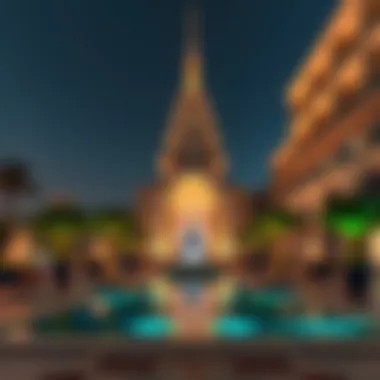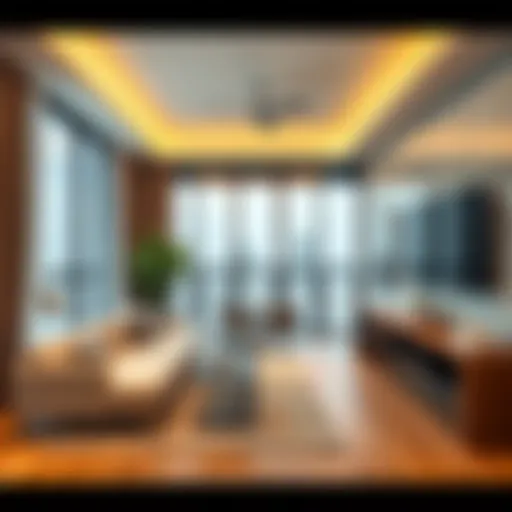The Essence of Luxury: 5-Star Hotels in Dubai


Intro
Dubai, a shimmering gem in the Middle East, is synonymous with grandeur and opulence. The city has staked its claim as a beacon of luxury tourism, with its five-star hotels standing tall, not merely as places to stay but as experiences waiting to be savored. They meld striking architecture, state-of-the-art amenities, and exceptionally tailored service into an offering that transcends the ordinary. But what does it mean for investors and travelers when it comes to these illustrious establishments?
As the city continues to evolve, so too does its hospitality landscape, shaped by emerging trends and vibrant tourist dynamics. This article aims to delve into the undercurrents that define the market of five-star hotels in Dubai, painting a holistic picture of what luxury truly embodies in this desert metropolis.
Market Trends
The hotel industry in Dubai has witnessed aggressive growth, driven by increasing global interest. Understanding the trends is vital for those considering either investment in this sector or visiting for pleasure.
Current Market Analysis
The current landscape reveals a robust market, buoyed by an influx of high-net-worth individuals and a steady rise in international tourists. According to the Dubai Department of Tourism, the city welcomed over 16 million visitors in the past year, with luxury accommodations enjoying a significant share of this population. Hotels like Burj Al Arab continue to set the bar high with unique design philosophy, creating an allure that remains unchallenged.
"Luxury is not in the richness of things, but in the absence of vulgarity." - Coco Chanel
Furthermore, hotels have adapted by enhancing their offerings. Wellness facilities, gourmet dining experiences, and personalized services are not just perks but expectations. Keeping up with technological advancements also plays a key role; smart room features that tailor experiences to guest preferences are becoming standard.
Much attention focuses on sustainability, where establishments are increasingly adopting eco-friendly practices. In a world where travelers are conscientious about their carbon footprints, hotels that prioritize sustainability stand to gain a competitive edge.
Future Predictions
Looking ahead, the trajectory appears promising. With Expo 2020, now taking place through 2021 and beyond due to the pandemic, the spotlight is on Dubai, attracting a plethora of visitors who are seeking high-end experiences. Reports indicate that luxury hotels are likely to see a surge in occupancy rates as international travel restrictions ease.
Shifting demographics, particularly younger affluent generations, are also altering the hospitality landscape. This demographic tends to favor unique, curated experiences over traditional luxury, pushing hotels to innovate continuously. As digital nomadism becomes a norm, hotels must adapt by offering versatile spaces conducive to both leisure and work.
Property Investment Insights
Investing in Dubai's luxury hotel market requires knowledge, and understanding the different types of investment properties is crucial.
Types of Investment Properties
- Condominium Hotels: These allow investors to buy an apartment in a hotel complex, adding a degree of flexibility to generate income when not in use.
- Luxury Suites: Acquiring premium units in sought-after hotels can yield strong returns, especially in high-demand areas.
- Hotel Partnerships: Joining efforts with established hotel brands presents opportunities without the need to manage day-to-day operations.
Financing Options and Tips
Navigating the financial nuances of investments can be daunting. Here are steps to streamline this process:
- Understand Local Regulations: Familiarize yourself with UAE property laws to avoid pitfalls.
- Engage a Local Expert: Using real estate agents with a grasp of the hospitality landscape can open doors to better deals.
- Consider Alternative Financing: Beyond traditional loans, consider options like peer-to-peer lending or investment groups to spread risk.
- Analyze ROI: Look beyond initial costs. Analyze potential rental yields and market appreciation.
With these insights, whether you're an investor or a traveler, grasping the intricacies of luxury hospitality in Dubai can define your adventure, both literally and figuratively. Explore, discover, and partake in the opulence that this city has to offer.
Prologue to 5-Star Hotels
When we talk about 5-star hotels, we're essentially discussing a realm where extravagance meets meticulous attention to detail. These establishments are not just places for travelers to rest their heads; they embody the very essence of luxury in hospitality. The staggering growth of Dubai as a 5-star hotel hub showcases why a closer examination of these hotels is vital. A visit to Dubai often intertwines with experiences at these opulent lodgings. For many, the allure of a plush room, personalized service, and exclusive amenities can make all the difference during an overseas trip.
The hospitality sector here is heavily influenced by the notion of luxury. For investors, understanding how these 5-star hotels operate is critical. The rather unique elements of these hotels—be it their architectural splendor or high-end services—provide insights not only into the travel preferences of affluent guests but also the economic landscape of luxury hospitality in this fast-paced city.
Key Points to Consider:
- The integral role of luxurious service in shaping guest experiences.
- How the rise of tourism in Dubai corresponds to the explosion of 5-star accommodations.
- The financial benefits for real estate investors willing to dive into hotel management.
Ultimately, this section paves the way for our exploration of what luxury truly means in the context of Dubai's hotels. It seeks to set the stage for understanding the architectural marvels and unparalleled amenities that define this world-class destination and attract travelers and investors alike.
Architectural Brilliance
The architectural design of 5-star hotels in Dubai is not merely about luxury; it's a statement of innovation and ambition. Every building whispers its own story, rooted in the rich culture of the UAE and the aspirations of its future. The importance of architectural brilliance goes beyond aesthetics; it embodies the essence of what it means to experience luxury. These structures often act as landmarks, drawing attention not just for their height or sculptural quality but for their ability to integrate functionality with artistry.
When you stroll through the city, each hotel beckons with a combination of panoramic views, intricate facades, and landscapes that seem to dance with tradition and modernity. Guests who step into these hotels often find that architecture enhances their experience, from the moment they check in to their last meal. It provides a sense of belonging and a mirror into the local culture. Moreover, these architectural wonders fuel the tourism industry, acting as magnets for both affluent travelers and aspiring investors.
Iconic Structures in Dubai
In Dubai, the skyline is peppered with structures that redefine the boundaries of design. From the Burj Al Arab, shaped like a sail, to the Atlantis, The Palm, which is designed to resemble the mythological island, each hotel is a small universe of luxury and comfort.
- Burj Al Arab: Often referred to as the only seven-star hotel in the world, it is a testament to opulence, with its lavish interiors and unparalleled service.
- JW Marriott Marquis: The tallest hotel globally, showcasing an impressive blend of modern design and traditional Arabian hospitality.
- The Address Downtown: This hotel stands out thanks to its breathtaking views of the Burj Khalifa and its proximity to the Dubai Mall.
These buildings are not just locally significant; they resonate on a global scale. Travelers from across the globe flock to these hotels, curious about their design and the experiences they offer. The architecture also sparks the imagination of investors, who see in these structures not just a financial opportunity but a legacy.
Sustainable Practices in Design


As luxury intertwines with responsibility, an increasing number of Dubai's 5-star hotels are focusing on sustainable architectural practices. In a city where excess has often defined luxury, the move towards eco-friendly design is refreshing and necessary. Hotels like The Armani Hotel and Rove Hotels are setting a precedent by incorporating green technologies and sustainable materials into their designs.
- Solar Panels and Energy Efficiency: Many hotels now rely on renewable energy sources. This reduces operational costs and provides an environmentally friendly alternative.
- Water Conservation Systems: Innovative water-saving technologies are designed to minimize waste, aligning with the city’s vision for sustainability.
- Locally Sourced Materials: Utilizing local stone and wood not only supports the economy but also reduces carbon emissions associated with transportation.
Emphasizing sustainable architecture not only improves a hotel's marketability but also aligns with the growing consumer demand for responsible tourism. In an era where environmental consciousness is becoming a metric of luxury, these hotels are setting themselves apart not just through lavishness but also through stewardship of the environment.
"Architecture is the masterly, correct, and magnificent play of volumes brought together in light." – Le Corbusier
As Dubai continues to establish itself as a luxury hotspot, the architectural brilliance of its 5-star hotels will play a crucial role in shaping the city's future. This blend of modern design, cultural authenticity, and sustainable practices is not something to overlook, especially for those looking to invest or simply enjoy the finer things in life.
Amenities and Services
When considering luxury in a five-star hotel, amenities and services stand as the pillars that uphold the grand notion of indulgence. They’re not just additional features; they’re what elevate the guest experience from ordinary to extraordinary. In Dubai, where luxury is also a form of competition, hotels continually seek to outdo one another, resulting in a dazzling array of options that cater to diverse demands. Let’s break down some of the prime offerings that define what guests can expect during their stay in this opulent city.
Gastronomic Experiences
Eating well is a fundamental part of any travel experience, and Dubai’s 5-star hotels have taken gastronomy to a whole new level. The culinary offerings are not just about feeding one’s hunger, but creating unforgettable experiences. Each hotel features multiple dining venues, offering diverse cuisines that range from Italian finesse at Armani/Ristorante to the succulent delights of Indus Restaurant that skillfully combines traditional Indian flavors with modern presentation.
“In the realm of luxury hospitality, dining is not just a service; it's an art form that tells a story.”
Moreover, many establishments host exclusive chef’s tables, where guests can engage directly with the culinary creators, and understand the craft that goes into each dish presented. With Michelin-starred chefs, farm-to-table concepts, and meticulously curated wine lists, it’s an experience that can make the most discerning palates rejoice.
Wellness and Recreation Facilities
In today’s fast-paced world, wellness is an increasingly critical component of the luxury experience. The five-star hotels in Dubai offer state-of-the-art wellness facilities, promoting relaxation and rejuvenation. Guests can unwind in lavish spas that often feature treatments designed with both local resources and international techniques. Many of these wellness centers also accommodate bespoke packages that cater directly to individual preferences.
In addition to spas, fitness amenities are equally impressive. The hotels typically provide leading equipment, personal trainers, and varied classes ranging from yoga to high-intensity interval training.
A notable example is the Jumeirah Al Naseem, where the beach is at your fingertips, allowing guests to blend fitness with stunning views. It’s more than just a gym; it’s an invitation to engage in a lifestyle that balances luxury with health.
Business and Event Services
The corporate world has a place in Dubai’s luxury hotels too. Many establishments feature extensive business facilities tailored for the modern professional. This includes private meeting rooms equipped with the latest technology, high-speed internet, and bespoke catering options, making them perfect for high-stakes negotiations and conferences.
Moreover, the strategic locations of these hotels in Dubai, such as in Downtown or near the Water Canal, offer convenient access to major business districts. Event spaces are equally grand, accommodating everything from lavish weddings to gala dinners. The attention to detail in planning, logistics, and execution often positions these venues as the preferred choice for multinational companies.
The synergy between stunning architecture, top-notch service, and the ability to host influential events is what distinguishes Dubai’s five-star hotels from the rest of the world, making it a key player in both the tourism and business sectors.
Cultural Influence and Authenticity
Cultural influence and authenticity stand as pivotal elements in the hospitality landscape of Dubai's five-star hotels. This vibrant metropolis, which has transformed from a modest fishing village to a global nexus of luxury, carries the essence of Emirati culture into its hospitality offerings. As international guests seek genuine experiences, the integration of local traditions into hotel services becomes not just a trend but a necessity.
Incorporating Local Culture
The art of incorporating local culture within hotel experiences is a nuanced undertaking. Each five-star establishment in Dubai, from the majestic Burj Al Arab to the luxurious Atlantis, The Palm, often draws inspiration from its surroundings. Items like intricate mosaics, traditional calligraphy, and Emirati folk art are carefully chosen to decorate lobbies and restaurants, creating a sense of place. This not only enhances the aesthetic appeal but also tells a story to guests who might be unfamiliar with the rich Arab heritage.
Hotels frequently engage local artisans to craft unique decor and furnishing items, turning the lobby or their suites into showcases of traditional Emirati craftsmanship. Such endeavors not only promote local talent but also immerse travelers in the local culture, fostering a deeper appreciation for the heritage of their host country. Additionally, cultural events, such as music performances or local cooking classes, can offer guests an interactive way to engage with the traditions of Dubai.
Moreover, the food scene is another area where local culture shines through. Many five-star hotels collaborate with renowned Emirati chefs to create authentic culinary experiences that resonate with visitors. By serving traditional dishes like Al Harees or Shuwa, hotels not only provide sustenance but also a taste of the storied past of the UAE. This blend of culture and luxury ensures that guests leave with memorable experiences that are authentically Dubai.
Art and Design in Hotel Spaces
Art and design in hotel spaces is where the fusion of modernity and tradition becomes most evident. Dubai's five-star hotels are not just places to stay; they are carefully curated art galleries that incorporate the bold aesthetics of contemporary design while paying homage to local customs.
In many hotels, you’ll find a collection of artworks by both local and international artists, with pieces that reflect the spirit of the Emirates. For instance, the One & Only Royal Mirage features artwork that evokes the elegance of Arabian architecture alongside striking modern influences. This blend can create a dialogue between past and present, showcasing how Dubai’s cultural evolution is represented in the arts.
Lighting also plays a significant role in creating ambiance. Many hotels utilize innovative and artistic lighting designs to highlight architectural elements while maintaining a soothing environment for guests. The artistic installation often creates focal points within the space, providing guests a chance to engage visually as they move through hotel corridors or relax in lounges.
Furthermore, the design approach is increasingly mindful of environmental sustainability. Utilizing local materials and eco-friendly practices in both art creation and hotel design resonates with many luxury travelers who value sustainability as an aspect of their luxury experience. Incorporating elements like natural stone or textiles sourced from regional artisans not only supports the local economy but also enhances guests’ connection to their surroundings.
In essence, the cultural influences and authenticity reflected in Dubai's five-star hotels creates a layered and enriching experience for visitors. By consciously integrating local culture, art, and design, these establishments offer more than just luxury; they provide a deep dive into the identity of a bustling metropolis.
"The true essence of luxury hospitality lies not only in lavish amenities but in the authenticity of experiences that connect guests with the locale’s heritage."
For more insights into the region's cultural landscape, you can visit resources like Britannica or Wikipedia for in-depth articles on Emirati culture.
Market Trends
Understanding market trends within Dubai's luxury hospitality landscape is crucial for investors and stakeholders looking to capitalize on the booming tourism sector. With the emirate positioning itself as a world-class destination, grasping the nuances of these trends can help anticipate future demands and make informed decisions.


The landscape of five-star hotels in Dubai is ever-evolving. Recent shifts in consumer preferences and global economic patterns subtly influence hotel offerings and investments. For instance, an increase in demand for sustainability practices has become a noticeable trend. Travelers today express preferences for establishments that prioritize eco-friendly initiatives, whether it's through sustainable building materials or waste reduction practices in dining.
Here are a few elements shaping market trends:
- Digital Transformation: The rise of technology is enhancing guest experiences. Hotels are integrating smart technologies for efficient service delivery, making use of apps for checking in and tracking orders. This has defined modern luxury, appealing to a tech-savvy clientele.
- Wellness Retreats: More travelers are prioritizing wellness over mere indulgence. Five-star hotels are responding by offering bespoke wellness packages, from spa services featuring locally inspired treatments to fitness retreats tailored for the health-conscious.
- Cultural Integration: Luxury hotels are becoming more than mere accommodations; they are venues celebrating local culture. Incorporating art and design that reflect Dubai’s rich heritage not only enhances guest experience but also boosts the hotel’s appeal in a sea of competitors.
Keeping abreast of these trends allows stakeholders to design services and built environments that align with modern expectations. It’s essential for investors to understand the specific needs and desires of their target audience, ensuring their hospitality ventures are both relevant and profitable.
Recent Developments in the Hotel Sector
The last few years have seen remarkable developments in Dubai’s hotel sector. Major brands are making significant moves, with several new luxury hotels opening their doors. Properties, such as Atlantis The Royal at The Palm, which debuted amidst much fanfare, brings fresh competition to the hospitality market while raising the bar for standards of luxury.
Expansion is also influenced by large-scale events. The Expo 2020, now held through March 2022, spurred investments in hospitality as the influx of global visitors created a pressing need for accommodation. New hotels are often designed with flexible spaces, not only hosting travelers but also offering conference facilities that cater to companies seeking a unique event experience.
Given the rapid growth, many establishments are focusing on tailored guest experiences. Customizable offerings—from personalized check-ins to curated activities—are becoming the norm rather than the exception. This allows hotels to stand out in a saturated market, providing both luxury and engagement.
Moreover, the collaboration of hotels with local businesses and celebrity chefs is setting them apart. Innovative dining concepts that highlight local flavors while infusing international cuisines provide a compelling reason for guests to choose one hotel over another.
The Impact of Global Events on Hospitality
Global events play a significant role in shaping the hospitality sector, particularly in a city like Dubai that draws visitors from around the world. The ongoing challenges posed by the pandemic have had an undeniable impact on travel patterns, leading to an increase in domestic tourism as international travel restrictions shifted market focus inward.
One of the most striking trends has been the heightened health and safety measures. Travelers now demand a higher assurance of cleanliness and hygiene standards. As a result, luxury hotels have adopted more rigorous protocols, enhancing their position as trustworthy vacation spots.
The rise of virtual events has also transformed the way hotels cater to corporate clients. With many organizations now opting for hybrid formats combining in-person attendance with online participation, hotels have quickly adapted by offering technologically enhanced spaces for seamless transitions between the two formats.
"In the wake of global challenges, flexibility and responsiveness in services have become vital for sustainability in the hospitality industry."
As Dubai navigates through unpredictable global dynamics, its luxury hotel sector continues to show resilience. The collective adaptation of businesses to emerging needs indicates that, while faced with challenges, the sector is poised for robust recovery and growth.
Understanding these market trends, recent developments, and the ramifications of global events equips investors and stakeholders with insights necessary to successfully maneuver the intricate and changing landscape of luxury hospitality in Dubai.
The Role of Technology
The hospitality industry, particularly in luxury sectors, has witnessed a seismic shift due to technological advancements. This transformation is essential for 5-star hotels in Dubai as they strive to enhance their operational efficiency and cater to the nuanced preferences of discerning travelers. Integrating technology isn’t just numbers and codes; it is about creating a seamless experience that resonates with modern spenders’ expectations.
Smart Hotel Concepts
In recent years, the term "smart hotel" has become prevalent, signifying a new wave of hotel establishments that leverage cutting-edge technology to provide elevated guest experiences. Smart hotels use various technologies, such as AI, IoT (Internet of Things), and mobile applications, to streamline operations. For instance, at hotels like the Burj Al Arab, guests may control room lighting, temperature, and even entertainment systems through their smartphones or tablets, offering a level of customization previously unheard of.
This concept goes beyond mere convenience; it's also about data. By analyzing guest preferences through their interactions with in-room technology, hotels can personalize services, which can lead to higher satisfaction rates. Imagine a guest arriving to find their favorite bottle of wine chilling in the fridge or a handwritten note welcoming them back on their nightstand. This level of attention to detail makes guests feel valued, ultimately driving loyalty.
Additionally, security has heightened with technology integration. Modern surveillance systems and smart locks enhance guest safety. The excitement lies in the potential evolution of these concepts, which can include further automation and even AI-driven personal concierges that manage guest requests seamlessly. The journey doesn't appear to have an end in sight, promising more innovative features that may soon become standard in luxury hospitality.
The Future of Guest Experience
As we look to the horizon, the future of guest experiences in 5-star hotels is set to be radically transformed by technology. Guest expectations are rising, and hotels are now challenged with delivering experiences that span beyond typical service. Here, technology plays a vital role.
- Augmented Reality (AR) and Virtual Reality (VR) are beginning to find their footing in luxury hotels. For example, VR can offer potential guests immersive virtual tours, allowing them to explore suites and facilities before making a reservation, effectively bridging the gap between desire and decision.
- Chatbots and AI-driven customer service systems can provide immediate assistance to guests, answering inquiries 24/7 and making reservations for dining or excursions without the delays often experienced in traditional settings.
- Finally, data analytics will continue to refine how hotels understand their guests. By tapping into past behaviors and preferences, hotels can tailor offerings, making each stay feel uniquely personal.
The continued integration of technology not only elevates guest satisfaction but also contributes to sustainability, as intelligent systems optimize resource use, making operations more environmentally friendly.
Challenges in Luxury Hospitality
Understanding the challenges facing luxury hospitality, particularly in a vibrant market like Dubai, is crucial for stakeholders including investors, hotel managers, and travelers alike. This multifaceted sector grapples with a variety of issues that can significantly impact the guest experience, operational effectiveness, and ultimately, profitability. In a city where opulence is a defining trait, navigating these challenges can mean the difference between success and failure in the fiercely competitive hospitality landscape.
Economic Fluctuations and Their Effects
Economic stability plays a significant role in the luxury hotel sector. Factors such as inflation, fluctuating currency values, and global economic downturns can all impact operational costs and guest spending behavior. For instance, during periods of economic uncertainty, potential guests may hold back on luxury expenditures, opting instead for budget-friendly accommodations. This shift can lead to decreased occupancy rates at high-end hotels, squeezing profit margins.
Moreover, with the rise of international travel to Dubai, events such as political unrest or health crises around the globe can also leave a mark. For example, the COVID-19 pandemic brought the entire world to a standstill, dramatically affecting the travel industry worldwide. Luxury hotels in Dubai experienced significant declines in bookings, leading to layoffs and temporary closures. It is vital for investors and managers to stay abreast of economic indicators and adapt strategies that can mitigate these risks.
- Balancing Costs: To maintain competitiveness, some hotels might be tempted to cut service quality or amenities, which could alienate their core guests.
- Flexible Pricing Models: Implementing dynamic pricing strategies allows hotels to adjust rates based on demand, helping them bounce back faster during economic downturns.
Competition Among Global Brands
Dubai's hospitality landscape has become a battleground for luxury brands vying for attention. High-caliber chains like the Burj Al Arab, Atlantis The Palm, and the Armani Hotel each bring something unique to the table. This fierce competition forces all players to continually innovate and enhance their offerings to attract discerning guests.
One significant challenge is staying ahead of the latest trends while maintaining brand identity. For example, a hotel renowned for its lavish spa services must ensure they are consistently updating their wellness offerings to include the latest in holistic treatments or fitness trends. Brands that fail to evolve risk becoming obsolete, even in a market as dynamic as Dubai.


- Unique Selling Proposition (USP): Each hotel needs a clear USP that distinguishes it from competitors. This could be an exclusive culinary experience, unparalleled customer service, or unique architectural design.
- Collaborative Efforts: Partnerships with local artists, authentic dining experiences, or cultural events can be a game-changer in attracting guests who value immersion in local culture.
Luxury hospitality is not just about providing rooms; it's about crafting memorable experiences. The competition demands a fine balance between innovation and tradition, where every new initiative must stay true to the essence of the brand.
In a world where every traveler seemingly seeks the next big experience, hotels must continually reinvent themselves to remain relevant.
By understanding and addressing the challenges of economic fluctuations and intense competition within the luxury segment, stakeholders can better position themselves within Dubai's constantly evolving hospitality market.
Investment Opportunities
Investment in luxury hotels not only represents the pinnacle of hospitality but also serves as a vital cog in the broader economic machine of Dubai. The city has transformed itself into a prime destination for high-net-worth individuals and tourists alike, making it an attractive choice for investors looking to capitalize on the booming hospitality sector.
Real Estate and Hospitality Investments
Real estate in Dubai, particularly in relation to 5-star hotels, often emerges as a beacon of reliability for investors. With key elements influencing rental yields and occupancy rates, understanding the market landscape becomes crucial. Factors such as location, proximity to attractions, and global events significantly shape this sector.
- Attractive Returns: The demand for luxury accommodations continues to rise, reflecting in higher occupancy rates and rental prices. In recent years, luxurious hotels have reported returns on investment exceeding industry averages, leading to a surge in investor interest.
- Strategic Location: Properties located near iconic attractions, like the Burj Khalifa or The Dubai Mall, typically command higher prices and a steady flow of guests. Investing in such prime real estate can mean better foot traffic and higher revenues.
- Government Support: The Dubai government actively promotes tourism through initiatives like the Dubai Expo 2020 and campaigns aimed at increasing visitor numbers. This creates favorable conditions for hospitality investments, aiding in boosting property values.
Investors should conduct thorough market research and consider the overall growth trajectory of Dubai’s tourism sector. Collaborative ventures or partnerships with established hospitality brands can also enhance credibility and operational success.
Best Practices for Investors
Navigating the world of luxury hotel investments necessitates an approach grounded in strategy and foresight. Here are several best practices to keep in mind:
- Due Diligence: Before jumping in, ensure a comprehensive understanding of the legal frameworks surrounding real estate in Dubai. Consider consulting with legal experts to navigate property laws and ownership regulations.
- Market Analysis: Keep a close eye on market trends. Tourist inflow, economic indicators, and competitor analysis play significant roles in forecasting profitability. Platforms like Statista can provide valuable insights.
- Leverage Local Expertise: Collaborating with local agents and consultants can offer a wealth of knowledge about the market. They can provide insights on developing neighborhoods and vacancy rates that might not be visible in broad market reports.
- Focus on Sustainability: With eco-conscious travelers on the rise, integrating sustainable practices into hotel operations can significantly enhance appeal. This not just reflects social responsibility, but can often lead to cost savings and efficiency.
- Diversification: While a strong focus on luxury hotels can yield high returns, it's wise to diversify your portfolio. Splitting investments across different property types can hedge against market fluctuations.
"In today's complex market, aligning investments in luxury hospitality with trends in consumer behavior and sustainability is key to ensuring long-term success."
Investing in luxury hotels in Dubai rests on understanding both the local intricacies and global hospitality trends. Through active engagement and strategic planning, investors can undoubtedly position themselves to reap substantial rewards in this thriving market.
Consumer Expectations and Trends
Understanding consumer expectations and trends is crucial to grasping the essence of luxury hospitality in Dubai. In an era marked by rapid change, guests' desires are evolving more than ever before. Luxury is no longer solely about opulence; it is now intricately tied to personal experiences, emotional connections, and sustainability.
Evolving Preferences in Luxury Travel
Today's luxury traveler is not just searching for a room with a view. They expect memorable experiences that appeal to their senses and cater to individual needs. For instance, a traveler might prefer a bespoke itinerary that takes them off the beaten path, offering them an authentic taste of local culture, rather than a generic sightseeing package.
"Luxury is not in the richness of the place, but in the richness of the experience."
Moreover, there’s an increasing emphasis on the practicality of amenities. Travelers often look for rooms equipped with smart technology, enabling them to control lighting and temperature with a touch. Even the culinary aspect has shifted. Guests appreciate restaurants that prioritize fresh, locally sourced ingredients, creating flavorful dishes that tell a story about the region.
This trend also reflects a growing desire for wellness. Hotels have begun to cater to this pronounced trend by including wellness programs, yoga sessions, and spa procedures tailored to individual preferences, reinforcing the notion that luxury travel should foster well-being.
Personalization in Service Delivery
Personalization stands at the heart of modern luxury hospitality. Today's consumers are more connected and informed, leading them to expect not just excellent service but tailored experiences that resonate with their tastes and preferences.
For example, a guest returning to a hotel after a year may be greeted by name, and could expect their favorite drink to be waiting for them in the room. It's this attention to detail that creates a lasting impact.
Hotels are investing in customer relationship management systems to ensure they track preferences effectively. Furthermore, travel planners and concierges are now empowered to create highly personalized experiences, from private dinners under the stars to private tours that hone in on a guest's hobbies.
The move towards personalization also extends to the ambiance of the hotel. Many five-star establishments are blending local art and culture into their designs to resonate with visitors. As a result, each space feels unique and tailored, offering guests a slice of Dubai’s rich heritage.
In essence, understanding and anticipating evolving consumer expectations in luxury travel is vital for the sustainability and growth of the five-star hotel market in Dubai. The race is on for hoteliers to listen closely to their clientele and innovate relentlessly, shaping a future where luxury is not just about lavishness but crafting individualized experiences that linger in guests' memories long after they’ve left.
Epilogue
When pondering the intricate web of five-star hotels in Dubai, recognizing the importance of the conclusion is vital. It serves as the final lens through which we can appreciate how these luxurious havens intersect not only with tourism but also with the rich tapestry of Dubai’s cultural and economic landscape. Following the journey through architectural marvels and gourmet offerings, the conclusion synthesizes these experiences into a broader understanding of what makes luxury in Dubai distinct.
The Future of 5-Star Hotels in Dubai
As we gaze into the horizon, the future of five-star hotels in Dubai appears both promising and dynamic. The mindset is geared towards continuous innovation, blending traditional hospitality with advanced technology. With a growing number of tourists seeking personalized experiences that go beyond standard offerings, hotels are rethinking their strategies. Expect to see more emphasis on bespoke services, where every detail is tailored to the guest’s individual preferences, creating unique memories that transcend the ordinary.
Moreover, sustainability will likely take center stage. With increased global awareness of environmental issues, hotels in Dubai will need to adopt greener practices, not merely as a trend, but as a fundamental element of their business model. This could reshape not just their operations, but also the expectations of luxury travelers. Evidence of this shift is already visible, with numerous hotels investing in eco-friendly designs and sustainable sourcing for their kitchens.
Final Thoughts on Luxury and Real Estate
In the bustling world of Dubai, luxury hospitality is inextricably linked with real estate. Investors are increasingly aware that the allure of a five-star establishment goes beyond just its opulence. High returns can be found in the carefully curated experiences offered to guests. As the real estate market evolves, the strategic placement of these hotels in prime locations becomes critical for enhancing their value.
The ongoing evolution of consumer expectations means that investors must remain astute, paying heed to trends and demands of affluent travelers. By aligning their investments with properties that showcase authentic local culture and world-class amenities, they stand to profit in this competitive market. In sum, the landscape of luxury hospitality in Dubai is set for significant growth, driven by innovation, sustainability, and a commitment to exceptional service.
"Luxury is not a price point but an experience that transcends the material."
As we conclude this exploration, it is crucial to embrace the understanding that Dubai's luxury hotel sector is not static but rather a constantly shifting phenomenon designed to cater to the evolving desires of discerning travelers and investors alike. As such, the future of five-star hotels in this iconic city promises not just opulence, but a multifaceted approach to creating memorable experiences.











